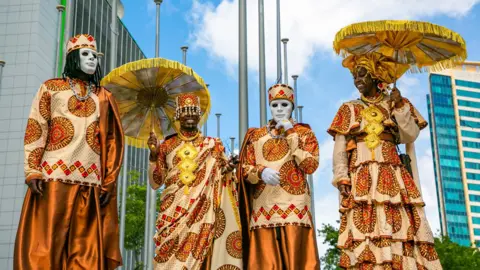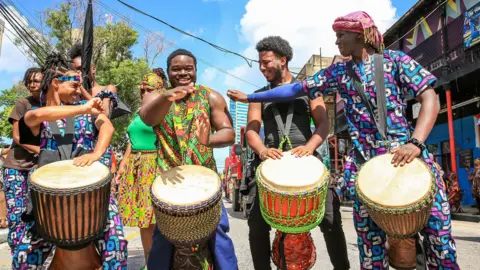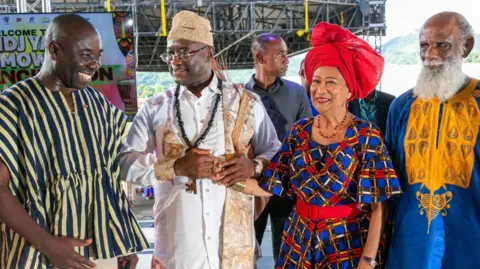BBC News
BBC News in St John’s
 EPA
EPAAugustine Ogbo works as a doctor, treating patients in clinics across the striking Caribbean island of St Lucia.
When he returns to his home in the coastal town of Rodney Bay, he clocks in for his second job – as the owner and solo chef of a Nigerian takeaway.
“Egusi soup and fufu, that’s more popular… they love jollof rice too,” Dr Ogbo says, reeling off a list of his customers’ favourite dishes.
The 29-year-old hails from Nigeria – population 230 million – but crossed the Atlantic for St Lucia – population 180,000 – to train as a doctor in 2016.
He set up his home-based takeaway, named Africana Chops, in 2022, after being incessantly asked by his St Lucian friends for Nigerian fare.
The takeaway is now thriving, Dr Ogbo tells the BBC, and not just because his island customers think the food is tasty.
“They know that we all have the same ancestral origin. So most of the time, they want to get in touch with that,” Dr Ogbo explains, adding that interest in African culture has grown “tremendously” since he arrived almost a decade ago.
St Lucia is not alone in this phenomenon.
Across the Caribbean, the desire to reconnect with the population’s African heritage appears to have strengthened over the past few years.
People across the Caribbean have been expressing African pride through cultural means, such as food, clothing and travel, while governments and institutions from both sides of the Atlantic have been meeting to forge economic ties.
Africa has had a long presence in the Caribbean.
A significant part of the islands’ population descended from enslaved West and Central Africans, who were forcibly transported to the Caribbean by European merchants in the 17th and 18th Centuries.
Slavery was abolished in much of the Caribbean during the 1800s, while independence from European powers came the following century.
The descendants of enslaved people retained some African customs, but largely developed their own standalone cultures, which differ from island to island.
In the past, there have been major campaigns to encourage African pride, as Dorbrene O’Marde, who runs the Antigua and Barbuda Reparations Support Commission, says.
“It was particularly strong in the 1930s or so, and then again in the 1960s – we saw a major outpouring in sync with the [American] black power movement during that period,” he says, talking to the BBC on the island of Antigua.
Mr O’Marde believes the Caribbean is witnessing a renewed, more promising version of such “pan-Africanism” (a term used to describe the idea that people of African descent should be unified).
“It has widened beyond psychological and cultural themes and we are now talking in broader economic terms, such as stronger transportation links between the Caribbean and Africa,” he says.
“We are in a different phase now of pan-Africanism – one that’s not going to wane like before.”
 EPA/Shutterstock
EPA/ShutterstockOne thing that separates this wave of African pride from the ones that came before is social media.
Dennis Howard, an entertainment and cultural enterprise lecturer at the University of the West Indies, says a “significant” amount of Jamaicans are connecting with Africa through platforms such as TikTok.
“People are learning more about black history beyond slavery,” he tells the BBC from his home in the Jamaican capital, Kingston.
Mr Howard also points to the global rise of Afrobeats, a musical genre from Nigeria and Ghana.
He feels that in Jamaica specifically, the popularity of Afrobeats is partly down to a desire to reconnect with the continent.
“Through the music videos, [Jamaicans] are seeing certain parts of Africa are similar to Jamaica and are developed. We had a concept of Africa as this place where it is backward and it’s pure dirt road… the music is changing that.”
Asked about the view of some Jamaican commenters online – that islanders do not need to reclaim their African heritage as they have an equally valid, hard-won Jamaican heritage of their own – Mr Howard stresses that the two are not distinct.
“Our whole culture is African, with a little sprinkling of Indian and European and Chinese. But for the most part it is African-derived. It is the most dominant part of our culture,” he says.
Those leaning into their African heritage are not just consuming the culture, but actually getting on flights and exploring the continent first-hand.
The tourism authority in Ghana – once a major departure point for enslaved Africans being shipped to the Caribbean – told the BBC there had been a “notable increase” in holidaymakers from the islands in recent years.
Similarly, Werner Gruner, South Africa’s consul to the Bahamas, says that over the past two or three years, his office has seen a rise in local people travelling to South Africa, Ghana and Kenya.
“I see a lot of interest in safaris and I think people also start to realise that South Africa and other African countries are actually very well developed,” Mr Gruner says.
 EPA
EPAEven Burkina Faso, an economically struggling country under military rule that is not well known for tourism, is apparently on some people’s buckets lists. Mr O’Marde says some of his countrypeople want to visit the country because of the pan-African leanings of its leader, Ibrahim Traoré.
Getting to the mother continent from the Caribbean can, however, be complicated, with travellers often forced to fly via Europe.
Earlier this year, in a speech in which she referred to herself as a “daughter of Africa”, Prime Minister of Barbados Mia Mottley called for the construction of “air and sea bridges” between Africa and the Caribbean.
“Let us make these changes, not just for heads of state, but for ordinary people who wish to trade, travel, and forge a shared future,” she said.
Key institutions like the African Union, African Development Bank (AfDB) and African Export-Import Bank (Afreximbank) have been working on the “trade” angle, hosting conferences and setting up memorandums of understanding with their Caribbean counterparts.
Afreximbank says trade between the two regions could jump from around $730m (£540m) to $1.8bn (£1.33bn) by 2028, provided the right conditions are achieved.
But at the moment, Africa and the Caribbean have some of the lowest indicators in the world for transport infrastructure, logistics quality and customs efficiency, according to the World Bank.
In an attempt to reduce trade barriers, the prime minsters of Grenada and the Bahamas this year called for Africa and the Caribbean to launch a shared currency.
Bahamian Prime Minister Philip Davis told delegates at an Afreximbank meeting in Nigeria they should “seriously” consider a single digital currency, while Grenada’s Dickon Mitchell said: “Such a move would symbolically and practically affirm our shared identity not just as trading partners, but as members of a truly global Africa”.
Getting more than 60 countries to coordinate and launch a standard system would be no easy feat, but Mitchell said this must be done if the regions are to “take control of [their] own future”.
Back in St Lucia, Dr Ogbo says his attempts to bring egusi, fufu and jollof to local people are a small but worthy contribution to the strengthening of relations between Africa and the Caribbean.
In June, Nigerian President Bola Tinubu signed various cooperation agreements with St Lucia during a state visit and Dr Ogbo sees Africana Chops as an extension of that.
“I can say I’m working hand-in-hand with the Nigerian government and even the St Lucian government to promote the African culture,” he says.
The doctor and businessman is now trying to upgrade his food business to a full-fledged restaurant – and he hopes the “cultural exchange” between Africa and the Caribbean also goes from strength to strength.
“It’s awesome!” he says. “I’m really, really excited about that.”
You may also be interested in:
 Getty Images/BBC
Getty Images/BBC#PanAfricanism #finds #fresh #momentum #Caribbean


